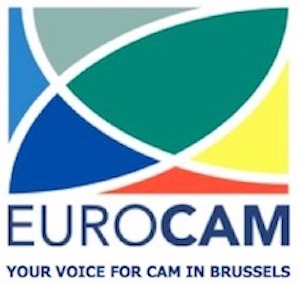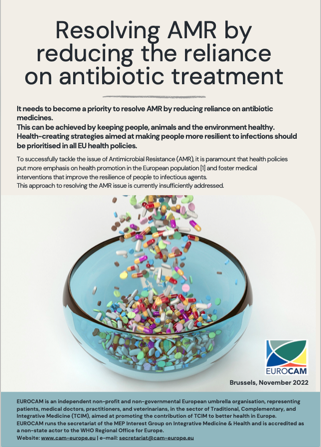Resolving AMR by reducing the reliance on antibiotic treatment
It needs to become a priority to resolve AMR by reducing reliance on antibiotic medicines. This can be achieved by keeping people, animals and the environment healthy. Health-creating strategies aimed at making people, animals and crops more resilient to infections should be prioritised in all EU health policies.
It is paramount that health policies put more emphasis on health promotion in the European population[1] in order to resolve Antimicrobial Resistance (AMR). Effective health promotion will significantly reduce our reliance on antibiotic medicines. Medical interventions that improve the resilience of people, animals and crops to infectious agents need to receive priority attention from the research community. This approach to resolving the AMR issue is currently insufficiently addressed.
An efficient immune system
Infectious illness arises when two factors come together: contact with an infectious agent (microbe) and, more importantly, the people’s susceptibility to the infectious agent. The presence of infectious agents is natural. There is ample evidence that people (and animals) with a well-balanced, active immune system are less susceptible to pathogens and fight off infectious diseases more effectively without the need for antibiotic treatment.
Definition of health
In 1946, the World Health Organization defined health as a 'state of complete physical, mental and social well-being and not merely the absence of disease or infirmity’[2], paving the way for a healthcare system founded on people’s resilience.
The modern definition of health also highlights this patient-centred approach, emphasising that health is: ‘The ability to adapt and self-manage in the face of social, physical and emotional challenges' [3].
This means shifting the perception of health away from a 'state of the absence of a disease’ to promoting patient-centred care and positive health[4] approach. Lifestyle choices and also treatments that regulate and improve the patient’s immune system responses play a central role in this health-creating approach.
An effective and sustainable approach
A European health strategy founded on prevention, health promotion and people’s resilience is an effective and sustainable approach to reduce the incidence of AMR:
- Healthy populations put less pressure on health care;
- Humans, animals and plants resilient to infectious diseases will need fewer antibiotics which reduces the incidence of AMR and reduces antibiotic pollution;
- The health promotion and resilience further a multisectoral One Health approach[5] to AMR;
- Medical research that invests in examining host factors will bring about health-oriented research and, consequently, health-promoting medicine.
The strategy to reduce AMR
Health promotion and resilience should be an integral part of any strategy to prevent and tackle AMR, alongside adequate preparedness, antibiotic stewardship, surveillance, and vaccine development.
EUROCAM proposes the following actions:
- Promoting healthy lifestyles in public education and social policies through targeted campaigns and the inclusion of lifestyle coaches in primary healthcare;
- Researching and investing in safe and effective, non-polluting [6] non-antibiotic treatments and models that help prevent, treat and manage acute and chronic infectious disease through improving patient resilience.
- Traditional and complementary medical techniques generally aim at facilitating and improving the resilience of patients, and therefore, their possible contribution to AMR should be examined. The sector has a wealth of knowledge and much experience to drive this research. Involving this sector is in accordance with the latest principles of One Health [7].
Establishing an effective, sustainable and resilience-oriented healthcare system requires action in the areas of policy, public education, research and development. Increasing the resilience of the population through better health will indirectly result in more resilient healthcare systems.
Sources:
[1]E.g. https://ec.europa.eu/health/system/files/2020-01/amr_2017_action-plan_0.pdf and https://eur-lex.europa.eu/legal-content/EN/TXT/PDF/?uri=CELEX:32021R0522&from=EN
[2] https://apps.who.int/gb/bd/PDF/bd47/EN/constitution-en.pdf?ua=1
[3] Huber M, Knottnerus JA, Green L, van der Horst H, Jadad AR, Kromhout D, Leonard B, Lorig K, Loureiro MI, van der Meer JW, Schnabel P, Smith R, van Weel C, Smid H. (2011) How should we define health? BMJ, 343():d4163. https://pubmed.ncbi.nlm.nih.gov/21791490
[4] Huber M, van Vliet M, Giezenberg M, Winkens B, Heerkens Y, Dagnelie PC, Knottnerus JA. (2016). Towards a 'patient-centred' operationalisation of the new dynamic concept of health: a mixed methods study. BMJ open, 6(1), e010091. https://doi.org/10.1136/bmjopen-2015-010091
[5] http://digitallibrary.un.org/record/842813/files/A_71_L-2-EN.pdf
More information on AMR:
In 2019 the European Committee for Homeopathy (ECH) held the conference on 'Homeopathy's role and value to address AMR'. Follow the link to more information and articles.

